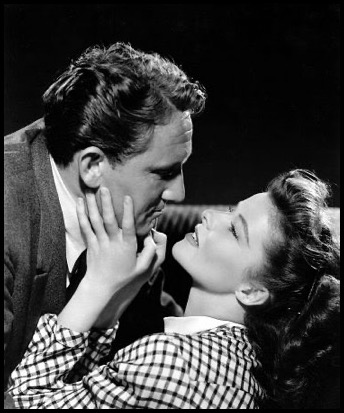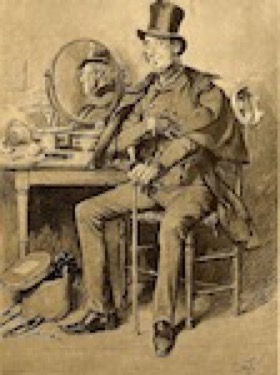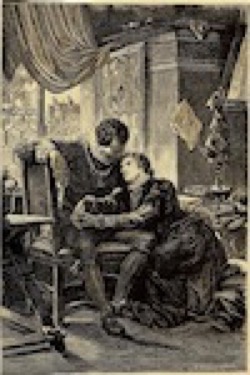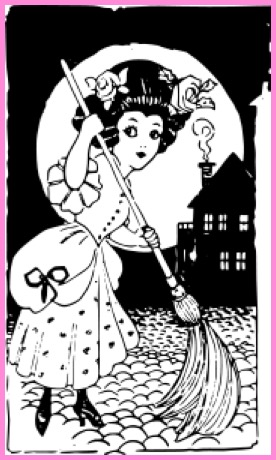Women's Studies
Critical Essay - Feminism
May/24/2022 01:25 PM Filed: Critical Essays

Woman of the Year (1942)
Katharine Hepburn and Spencer Tracy
Metro-Goldwyn-Mayer (work for hire)
(Wikimedia Commons)
Feminism hangs out with the young, openminded woman. Traditionalism socializes with the mature, conservative matron. Familiar associations fail to define what either emotion-packed term means when enacted, blindly leading to assumptions about lifestyle.
Twenty-first-century ideals embrace feminism, yet the meaning of tradition in a woman's life does not equate with loss of freedom. Staid, old, and structured, governed by organized religion, conventional confinement remains synonymous with traditionalism, an unfortunate comparison. A feminist, in reality, could be bound tighter by a self-inflicted doctrine that inhibits creativity and happiness, cutting her away from time off, time enjoyed, and time employed at home.
A traditional woman could be married or unmarried, homosexual or heterosexual, religious or an atheist. Over time, distortions marred the value of tradition, rendering the concept counterproductive and entwining the ideology with our past. A feminist serves as a pillar of her community, setting an example, working endlessly, while a traditionalist leads a life dictated by the patriarchy, another common fallacy.
Laden with political baggage and growing heavier as decades pass, these overburdened and overused words bog down any woman seeking options, opposed to abiding by a set of rules. Feminism adheres to an arrangement comparable to traditionalism, admired by those who wish to reestablish a daily norm, making the routine aspects of living compatible with contemporary society. Not always beneficial, often flouted, this intellectual change initiated insincere commitment to a grindstone deemed superior.
Until traditionalism crawls out of the maligned alternative-lifestyle attic, discontentment will besiege the woman eager to reach her potential without jumping off a personal ledge holding onto an unwanted moniker attributed to a group rather than an individual.
Literary Perspective - Women in Rebellion
October/13/2016 11:11 AM Filed: Literary Perspectives

Credit: E. Hess
(Wikimedia Commons)
Women in Rebellion
As the women’s movement progressed from gaining the right to vote to acquiring freedom to pursue a career, reactions to equal status have not always been positive. Stereotypical problems include difficulty in combining a job and motherhood, fear of losing femininity, and desire to cling to indoctrinated roles.
Strangely, a woman sometimes rebels against patriarchal authority by rejecting independence rather than accepting it. Every decade she fights new battles and acquires political ground, while a traditional archenemy yanks her back.
In feminist literature, a patriarch can be any man—a minister, a father, a husband—even men in general. Although the device may be overdone, this technique is effectively used to address sensitive gender issues. In fiction, as in life, women can be their own worst enemies by not communicating, leading to lack of courage and assertiveness.
Literary Perspective - Quest for Cupid
October/13/2016 10:52 AM Filed: Literary Perspectives

Credit: E. Hess
(Wikimedia Commons)
Quest for Cupid
Women in pursuit of affection have controlled romance fiction throughout the centuries. Although the hero appears to dominate stories, it is the heroine who manipulates plot. At the heart of the female sexual fantasy is a desire for exclusivity, or at least, that’s what women have been taught. In certain situations, this belief can be proven incorrect, but that stereotypical assumption is usually taken for granted.
The quest for a lover’s mind, body, and soul supports the foundation of matrimony. A contemporary, legally binding relationship is a partnership, and perhaps, an ideal environment to raise children. Few educated couples want the right to possess each other, but this psychological drive persists, a throwback to the past.
Tension between illusion and reality causes conflict between an individual’s perceived and actual world. When expectations remain unfulfilled, fantasy takes over. Fantasy is a psychological safety valve that routes disillusionment into a comfortable, soothing place. Some call this an inner light, while others describe it as mere daydreaming.
Epiphanies rarely involve unconditional love. When a character’s behavior appears altruistic during a revelation, motivating factors tend to be self-glorifying, often defensive. Even in progressive countries like the United States, social transitions are never immediate. Romance novels reflect an ongoing period of adjustment and adaptation.
Literary Perspective - Turbulence Beneath the Calm
October/13/2016 10:32 AM Filed: Literary Perspectives

Credit: E. Hess
(Wikimedia Commons)
Turbulence Beneath the Calm
Women in transition are often portrayed with a calm demeanor in literary stories. Disputes remain low-key or nonexistent, unlike mass-market fiction in which arguments escalate to violence. These scenarios present exaggerations, inaccurate illustrations of reality, but skilled authors know the importance of achieving dramatic effect through understatement.
Beneath a quiet, unassuming woman lingers a passionate side she keeps concealed due to the dictates of society. Underlying turbulence within placid, easygoing heroines is a common device to counteract hysterical, drug-subdued portrayals. A high-strung woman meets disrespect unless her anxiety-driven personality is career-oriented.
In the past, creative energy could not be focused on a professional endeavor because it undermined a woman’s responsibility as a nurturer and caregiver. In contrast, men are frequently depicted suffering from neurosis, while an uncaring woman lurks nearby. Neither role is appealing.
ForeWord Review - Every Day a Holiday
January/08/2015 01:58 PM Filed: ForeWord Reviews

A collage of vintage memories and modern musings, this collection of vignettes will ignite a real spark of life in a contemporary society immersed in an artificial digital age. Writers who agonize over finding just the right word, obsessed with making a startling impact more than leaving a visual imprint, will learn from Ellis’s ability to present a scene in a concise yet commanding manner. Her goal is to entertain and educate, inspiring new traditions.
Impressions - Sexism
June/11/2014 10:43 AM Filed: Impressions

Sexism: Blatant and Insidious
Is sexist indoctrination clouding our vision? Merriam-Webster defines unfair treatment of people because of their sex, especially against women, in two ways:
1) Prejudice or discrimination based on sex.
2) Behavior, conditions, or attitudes that foster stereotypes of social roles based on sex.
It is the second definition, a subtler manifestation, that is the greatest concern in contemporary America.
ForeWord Review - Anna Heyward Taylor
July/23/2013 10:02 AM Filed: ForeWord Reviews

This absorbing collection of letters gives the reader a behind-the-scenes look at a world-renowned South Carolina artist. Anna Heyward Taylor (1879-1956) was known for her naturalistic watercolors and innovative printmaking. An early feminist, she thrived in an independent, free-spirited environment of her own, never succumbing to traditional expectations upheld by the social order of her time.